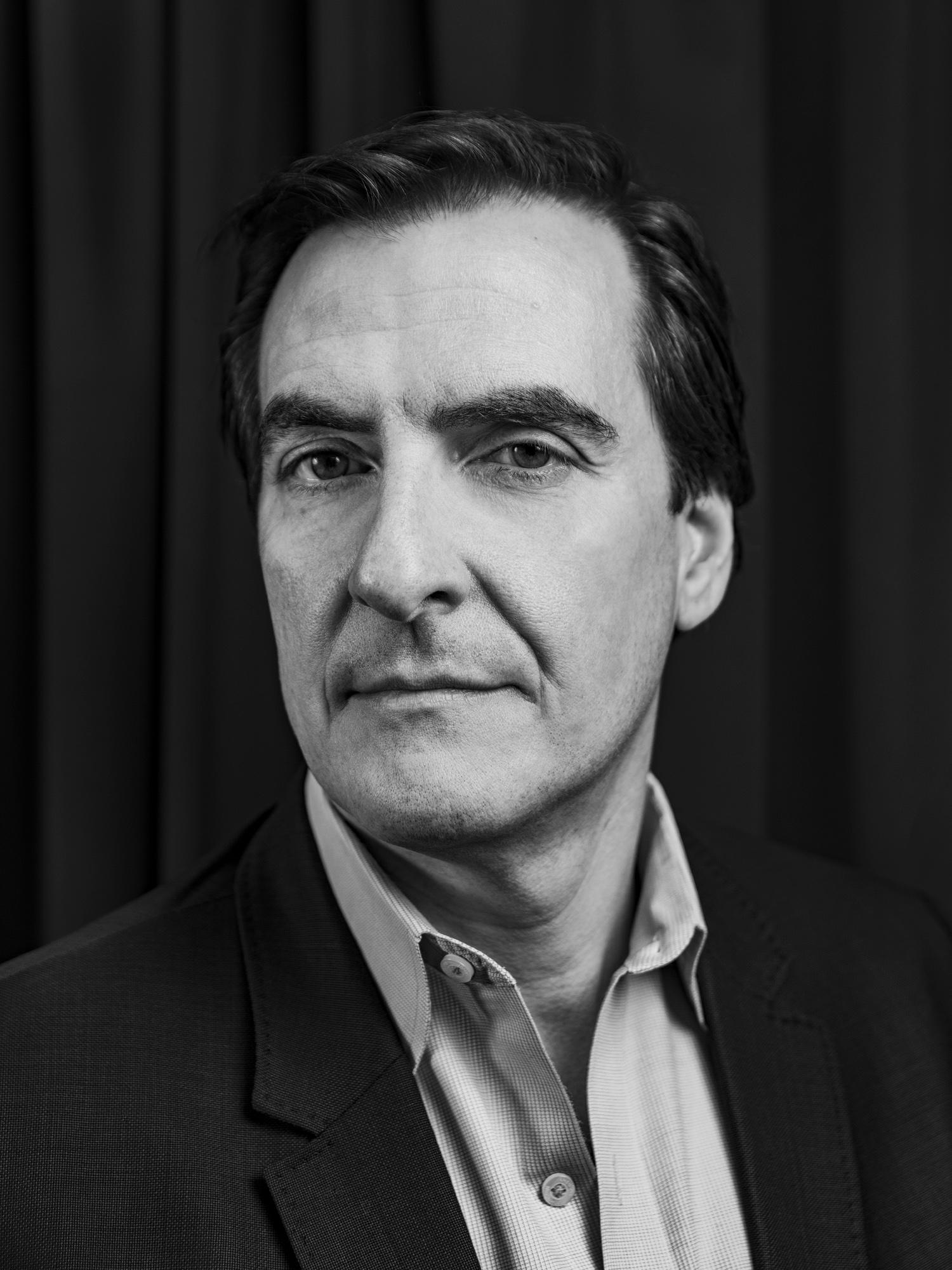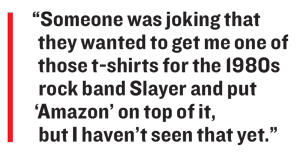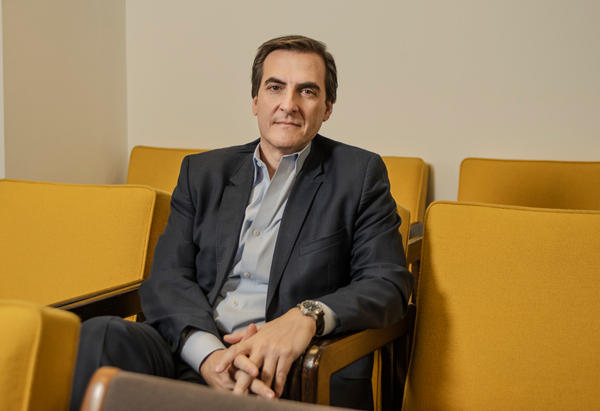Trending
The Closing: Michael Gianaris
The New York State Senator and “Amazon slayer” on his Greek pride, facing off against real estate and rooting for Bernie Sanders

State Sen. Michael Gianaris has been an elected official in New York for the past 20 years and became one of the most pivotal figures in state politics last year when he played a key role in derailing Amazon’s plan to build half of its second headquarters in Long Island City. The city is still dealing with the aftermath of the Seattle-based company’s abrupt departure last Valentine’s Day — which happened in the face of local opposition to the more than $3 billion in subsidies it would have received under the deal. But Gianaris has no regrets about his role in Amazon’s withdrawal and said he wouldn’t do anything differently today. He noted that the e-commerce giant already has plans to grow its presence in New York and generate new jobs without the subsidy package from the city and state. Gianaris was elected to the New York State Assembly in 2000 and was nominated to run for departing state Sen. George Onorato’s seat in 2010, which he easily won. The Queens native was born and raised in Astoria, where he still lives today, and he has seen the area dramatically change since he grew up there in the 1970s and 80s, due in large part to the real estate industry. Gianaris’ relationship with landlords, developers and other industry players has also changed over the years. Over the course of his political career, he shifted from accepting donations from the Real Estate Board of New York, Glenwood Management and others in the business to swearing off real estate donations altogether. During a lengthy sit-down interview at his district office in January, Gianaris dished on some of his more notable fights in state politics, what Albany may have in store for 2020, and whether fame has changed his friend U.S. Rep. Alexandria Ocasio-Cortez.
DOB: April 23, 1970
Lives in: Astoria, Queens
Hometown: Astoria, Queens
Family: Divorced; no children
What’s your full name? Michael Nicholas Gianaris.
What were you like as a kid? I was in a program that allowed kids to skip the eighth grade. I was generally short for my age, and I was a year ahead, so I was always like the shortest kid in class. I was kind of like everybody’s little brother growing up.
Were you a good student? I was good. You had to be good to get into that program.
What did your parents do when you were growing up? My parents were both immigrants. They came over from Greece. My dad was a professor of economics at Fordham University for many years. My mom worked at a library, but once she had my brother and me, she stayed at home and took care of the family.
What are some of the biggest changes you’ve seen in Astoria in your lifetime? Astoria was always an immigrant enclave, and it was the classic New York story of one immigrant group coming and replacing another. Before my time here, it was a German neighborhood; then it was an Irish neighborhood; then it was an Italian neighborhood; and then it became a Greek neighborhood. That’s kind of where the pattern broke because the changes in western Queens started happening.
What was your first job? The first thing I ever did was hand out flyers for a local liquor store. My first real job was in college, when I worked at American Standard — the company that makes the urinals and toilets. I maintained their legal library.
 How did you get started in politics? When I was in college, Mike Dukakis was running for president, and this community in particular was energized. For immigrants, to see someone of their own ethnicity credibly run for the highest office in the land is an amazing affirmation of what America stands for. My involvement in the campaign was voter registration drives and galvanizing young Greek Americans to get involved. We registered over 10,000 people just in this neighborhood.
How did you get started in politics? When I was in college, Mike Dukakis was running for president, and this community in particular was energized. For immigrants, to see someone of their own ethnicity credibly run for the highest office in the land is an amazing affirmation of what America stands for. My involvement in the campaign was voter registration drives and galvanizing young Greek Americans to get involved. We registered over 10,000 people just in this neighborhood.
Is your Greek heritage important to you? It sure is. I was the first Greek American elected to office from New York City, which is really something. I’m fluent in the language. When I first ran for State Assembly, my opponent was also Greek, and we had a debate on a Greek language channel.
We’re coming up on the one-year anniversary of Amazon abandoning its plans for Long Island City. Do you feel like your role in squashing the “HQ2” deal was overstated or understated at all? I’ve heard all sorts of different things about it — from I was single-handedly responsible to I was a bit player to everything in between. I don’t much care about what the perception is. I just know that I fought like heck for my community, and I happened to be in a particular role that gave me a voice in that process. The deal that was presented to us was horrible, and it appears [Amazon is] arriving in New York anyway. If they come and bring those jobs, then we will have saved New York $3 billion, and that will be a great outcome.
So, you don’t agree with the criticism that Amazon’s current plans for New York are crumbs from the table compared to HQ2? No. That’s bullshit. It’s my expectation that the job numbers will continue to grow as the years go by. And if we have this conversation 10 years from now, you will see that they will be at the numbers they were promising under HQ2.
How do you feel about being dubbed “the Amazon slayer?” I did what I thought was right, and I still believe it was right. Someone was joking that they wanted to get me one of those t-shirts for the 1980s rock band Slayer and put “Amazon” on top of it, but I haven’t seen that yet. Maybe that’s for the best.
Did the whole episode change your relationship with the real estate industry? I think that’s fair to say. My allegiance to tenants and people struggling to afford their homes was made clear.
You initially signed a letter supporting the city’s bid for Amazon. What made you turn against it? That was a very general, generic letter with no specific terms. When the deal was announced, I expressed my position almost immediately. The more I dug into what Amazon stood for and what it has meant to Seattle, the worse I felt about them.
 Is there anything you would have done differently throughout the process looking back? I don’t think so. I wish I had known the terms of the deal before it was announced because we could have intercepted this problem before it reached a crisis point. But I did try and was unable to get that information because the state and city signed an NDA with Amazon.
Is there anything you would have done differently throughout the process looking back? I don’t think so. I wish I had known the terms of the deal before it was announced because we could have intercepted this problem before it reached a crisis point. But I did try and was unable to get that information because the state and city signed an NDA with Amazon.
You were also seen as a big player in getting rid of the Independent Democratic Conference. Was that a tough fight? It was a very tough fight because we had forces within the Democratic Party that were not helpful. There was an element of banging our heads against the wall because, other than us in the Senate, few people were listening. Ultimately, it was grassroots energy that won those elections.
Do you consider that a victory, or is it just frustrating that it took so long? It was a huge win in the sense that people finally rose up and took care of business. It’s very frustrating that we lost the better part of a decade of progress while we were waiting for that to happen.
Did you have any major confrontations with Jeff Klein or any other IDC members? All the time. It was my job to get us to the majority, and they were the single biggest impediment. The game that was often played was them declaring support for all the right issues but then, somehow, teaming up with the group that was preventing them from happening. And real estate was at the center of it.
What are some of the bigger confrontations you’ve had with the real estate industry over the past few years? I think there were three pivotal points. One is when I said I wouldn’t take contributions from the industry; one was Amazon; and then the rent laws were the third. We are clearly estranged now. There’s not much opportunity for confrontation because we don’t talk.
Did they lobby you at all on Amazon or the rent laws? They were communicating with the Senate, but it was generally not with me.
How has the real estate industry’s relationship with Albany changed over the course of your career? They were the single biggest supporters of the Senate Republican majority. They used that majority to decimate tenant protections over a couple of decades. There’s been a realignment now where they have to find their place in the world.
Do you think they’re in denial? Maybe initially. Not anymore. These are smart people.
You accepted donations from REBNY, Glenwood Management and others earlier in your career. What made you decide to stop accepting real estate donations in 2018? It was a combination of the fact that we were entering a majority for the first time in my time in the Senate and that the rent laws were coming up that very year. I didn’t want anyone to have a misperception about my allegiance to the people I represent.
Are there other industries you would refuse to take donations from? I’ll take it on a case-by-case basis. But the real estate industry is the single largest donor base in New York, so they have a unique position in this conversation.
What are your general thoughts on the rent reforms Albany passed last summer? I’m very proud of them. We’re already seeing evictions drop. That is precisely the outcome we wanted: to keep people in their homes and reverse the dynamic that had taken hold, where turning people out of their homes was a business model for the real estate industry.
Have you spoken much to people in the real estate industry since then? Just if I bump into them at some common event.
What are some of your main goals for the 2020 legislative session? The budget looms large over everything. The deficit is significant. Dealing with that is going to be a major challenge. We’re into the conversation now about public resources and public services that have been deprived of the investment they need. Unfortunately, we need to have that conversation at a time when we’re facing a deficit.
Are you planning to renew efforts to end rent increases for Major Capital Improvements and Individual Apartment Improvements? Yes. We’re continuing to evaluate the historic reforms that we made and gathering data about how they’ve worked and how they haven’t worked.
What about good cause eviction? A number of members support it. I support it, but I can’t predict whether it’s going to happen or not.
And the pied-á-terre tax? I hope so. Who are we protecting by not doing it? We’re protecting rich foreigners who maintain empty penthouse apartments in New York. It doesn’t make any sense to me.
What is the hardest part of your job? The vitriol that has infected our politics over the last couple of years. It’s becoming very difficult to disagree respectfully.
How close are you and Rep. Alexandria Ocasio-Cortez? We work together extremely well. We collaborate on a lot of issues. We obviously overlap districts, and so we’ve had mobile offices and town halls together.
Has your relationship changed since she became a national star? No. She’s remarkably down to earth.
Do you ever think about serving as governor or taking on another role in politics outside of the state Senate? I’m in a unique position right now in the Senate as the deputy leader and the highest-ranking senator from New York City. But if opportunities present themselves in the future, of course I’ll take a look at them.
What is the biggest mistake you’ve made in your career? Not being aggressive enough with the IDC at the beginning. Many of us initially took the approach of trying to work it out and didn’t realize that the goal on the other side was never to work it out. Their purpose was to create division.
When you leave a room, how do you want to be remembered? As a straight shooter. Even if someone disagrees with me, I would hope they would think I came at it from the right place and in an honest way.
Do you own or rent in Astoria now? I own.
Do you have any other homes? No, just the one I live in.
What do you do to unwind? I like to go out and get a nice dinner. We have a number of great restaurants here in Astoria.
What about in Albany? I don’t relax in Albany.
You turn 50 in April, right? Yeah. Thanks for reminding me.
Any big plans to celebrate? My plan is to ignore it.
What was your last big purchase for yourself? My living room television. It’s a 61-inch smart TV. It’s nice.
What is your biggest vice? Anxiety. It’s hard for me to relax because my brain is constantly churning, and my sleeping habits are poor for that reason.
Who’s going to win the Democratic nomination for president this year? I’m supporting Bernie Sanders.
Who’s going to win the U.S. Presidency in November? Same answer.
What do you say to Queens residents who are Donald Trump fans? They’re wrong. I respect people who disagree, and they’re certainly entitled to their opinion. But this man has been the most dangerous element of our politics and has taken us in such a horrible direction, both on a policy level and in terms of the public discourse, that it’s going to take years and years to come back from it.
— Edited and condensed for clarity.




